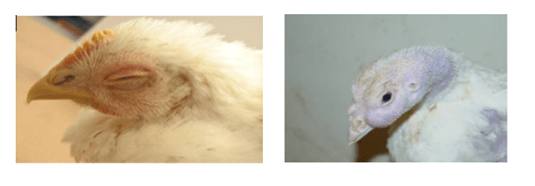Avian metapneumovirus (aMPV) on Delmarva
Avian metapneumovirus (aMPV), a highly contagious respiratory disease, is a growing concern on Delmarva, particularly affecting turkeys and chickens, and can lead to secondary bacterial infections, increased mortality, and decreased egg production.
Key Characteristics of aMPV:
¨ Highly Contagious: aMPV is a viral disease that spreads easily among poultry.
¨ Respiratory Disease: It primarily affects the respiratory system, causing signs like swollen heads, nasal discharge, and coughing.
¨ Secondary Infections: aMPV weakens the immune system, making birds more susceptible secondary bacterial infections, which can be severe and even fatal.
¨ Economic Impact: aMPV can lead to significant economic losses for poultry producers due to increased mortality, decreased egg production, and the need for costly treatments.
¨ No Vaccine: Currently, there is no commercially available vaccine for aMPV in the United States.
¨ Subtypes: aMPV can be classified into different subtypes (A, B, C, and D) based on genetic and antigenic properties.
Symptoms and Signs of aMPV in Poultry:
¨ Swollen Heads: A common symptom
¨ Nasal Discharge: Mucopurulent, turbid nasal discharge is a sign of infection.
¨ Respiratory Signs: Coughing, sneezing, snickering, and tracheal rales (wheezing or rattling sounds).
¨ Lethargy and Anorexia: Infected birds may appear sick, unthrifty, and lose appetite.
¨ Ruffled Feathers: A sign of illness and discomfort.
¨ Decreased Egg Production: Older layers may experience a significant drop in egg production.
¨ Mortality: Especially severe in older birds and can be exacerbated by secondary bacterial infections.
Management and Prevention:
¨ Early Detection: Prompt diagnosis and treatment of secondary bacterial infections are crucial to reduce the negative effects of aMPV.
¨ Biosecurity: Implementing strict biosecurity measures can help prevent the spread of the virus.
¨ Good Management Practices: Maintaining a clean and healthy environment, proper ventilation, and dry litter can help reduce the risk of infection and secondary bacterial infections.
¨ Testing: If you suspect an aMPV outbreak, contact your veterinarian immediately and consider sending birds for testing.
¨ Reporting: Maryland residents report suspected aMPV outbreaks to the Maryland State Department of Agriculture's Animal Health Diagnostic Laboratories (410-543-6610 or 301-600-1548).
¨ USDA Reporting: aMPV is a reportable disease at the federal level, so report to the USDA as well.
VISIT HIGHLY PATHOGENIC AVIAN INFLUENZA RESOURCE PAGES HERE
Back to Commercial Poultry News - April 2025
